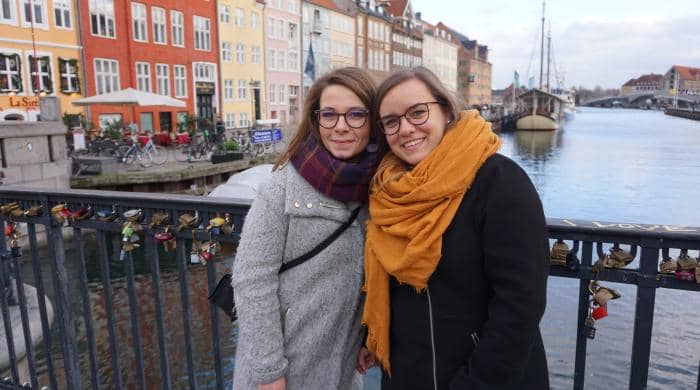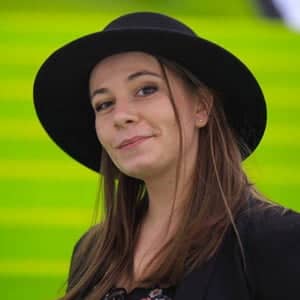Vannak olyan dolgok, amelyek már annyira természetesek, hogy azt hinnénk, semmi újat nem fedezhetünk már fel bennük! Ezt gondoltuk Bellával az ökumenizmusról, hiszen itt Erdélyben, az IKE-ben teljesen normális az, hogy mindenki tartozhat egy közösséghez, felekezettől függetlenül. Vannak ökumenikus imahetek, az ificsoportokba bárki járhat, tartunk olyan istentiszteleteket, ahol mindenféle vallás képviselve van, fesztiváljaink szervezésében is szempont ez.
És mégis, a koppenhágai Be1! (Be one, legyetek egyek!) Ökumenikus kurzus tudott újat mutatni nekünk! Sokat! Leginkább a természetességről, arról, hogy milyen áldásos az, amikor egymást felkarolva, segítve, együtt dolgozva szolgáljuk közösségeinket. A B1! kurzusra Európa különböző pontjairól érkeztek a fiatalok, voltunk ott norvégok, finnek, svédek, törökök, magyarországiak, szlovákok, szerbek, franciák, britek, dánok, és mi, erdélyiek. Avagy evangélikusok, ortodoxok, reformátusok, katolikusok. Leginkább a dán rendszerbe nyertünk betekintést, ahol annak ellenére, hogy a dán nemzeti egyházhoz tartozik a lakosság több mint 80%-a, bőven akad kisebbségi vallás is. Az evangélikus-lutheránus egyház mellett jelen van a katolikus, ortodox, adventista, baptista, stb. egyház is. A hétvégénk során ezeket jártuk be, Koppenhága és környékbeli templomokat látogattunk meg, lelkészekkel beszélgettünk, énekeltünk, imádkoztunk, és nagyon sokat kávéztunk, mert úgy tűnik, ez egy dán specifikum, hogy folyton kávéznak, néha még istentisztelet közben, után is. Gyönyörű templomokat láttunk, klasszikusokat, régieket, de olyanokat is, amelyeket nemrég építettek. Ezeknek egyik érdekessége, hogy mindenikben hatalmas közösségi terek vannak, ahol az istentiszteleten kívüli tevékenységeket tartják, és a kávét főzik.
Az egészben a legszebb az volt, amikor arról meséltek, hogyan dolgoznak össze, milyen közös, ökumenikus tevékenységeket szerveznek közösségeik számára. Ez az utolsó esti Taizé-s dicsőítésen mutatkozott meg leginkább, ahol a helyi baptista templomban gyűltünk össze, a dicsőítést a baptista lelkész vezette, az imát a katolikus, az evangélikus-lutheránus és az adventista lelkész mondta, az igéket pedig mi olvastuk fel, mindenki saját anyanyelvén. Ekkor erősödött meg bennünk az, hogy az ökumenizmus valóban a világ legtermészetesebb dolga, azonban ezért tennünk, dolgoznunk és nyitnunk kell mások fele. Mert mindenki különleges és csodálatos, izgalmas története és tapasztalata van, amelyekből rengeteget lehet tanulni.
Valahogy így volt ez közöttünk is, résztvevők között, akikkel a kezdeti ismerkedés után igen izgalmas és mély beszélgetéseket is folytattunk, aztán persze, gyertek Erdélybe, Párizsba, Berlinbe, stb. mondattal váltunk el!
Amúgy Koppenhága gyönyörű, borzasztóan szeles, rengeteg a bicikli, nagy a nyugalom és a csend, hatalmas ablakok vannak a házakon, de ezeken nincs függöny, a színes házak filter nélkül is nagyon szépek, nappal, mert este nincsenek kivilágítva, a tömegközlekedés szinte tökéletes, a kávé nem igazán erős és a fahéjas csiga mennyei!
[ENGLISH VERSION]
There are things that are so natural that we think we can’t discover anything new! That’s what Bella and me thought of ecumenism, because in Transylvania, at YMCA it’s normal that everyone can belong to a community, regardless of their denomination. There are ecumenical prayer weeks, youth groups are open to anyone, we hold worship services where all religions are represented, and this is also an aspect of organizing our festivals.
And yet, the Be1! Ecumenical course in Copenhagen could show us new things! Most of all about how blessed it is to serve our communities by embracing, helping, and working together. The Be1! course was attended by young people from all over Europe, we were Norwegians, Finnish, Swedish, Turkish, Hungarians, Slovaks, Serbians, French, British, Danish and Transylvanians. Or from the other perspective Lutherans, Orthodox, Reformed, Catholics.
During the weekend we gained insight into the Danish system, where, despite the fact that to the Danish National Church belongs more than 80% of the population, there are also a lot of smaller denominations also. There is the Catholic, the Orthodox, the Adventist, the Baptist, etc. church also. Over the weekend we visited churches in Copenhagen and it’s surrounding areas, talked to pastors, sang, prayed and had a lot of coffee, because it seems like a Danish thing to have coffee all the time, sometimes even during worship. We have seen beautiful churches, some of them old ones, but also some which were recently built. One of the interesting things about them is that they all have huge rooms where they can do different activities, and of course drink coffee.
The best part was listening to them when they spoke about how they work together, what common ecumenical activities they have for their communities. This became very evident at last night’s Taizé worship, where we gathered at the local Baptist church, the worship was led by a Baptist pastor, the Catholic, Lutheran and Adventist priest led the prayers, and we read passages from the Bible in our own language. It was then when we got convinced that ecumenism is (or should be) indeed the most natural thing in the world, but for that we have to work, do steps towards it every day and be more open. Because everyone has a unique, wonderful, exciting story and experience to learn from.
Somehow, this was the case with us, among the participants, with whom we had very exciting and deep conversations after the initial acquaintance
By the way, Copenhagen is beautiful, terribly windy, there are lots of bikes, it is very chill, there are huge windows on the houses but no curtains, the colorful houses are beautiful even without filters, public transport is almost perfect, the coffee is not very strong and the cinnamon roll is just yummmi!



